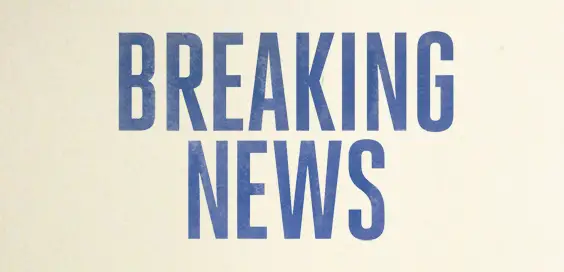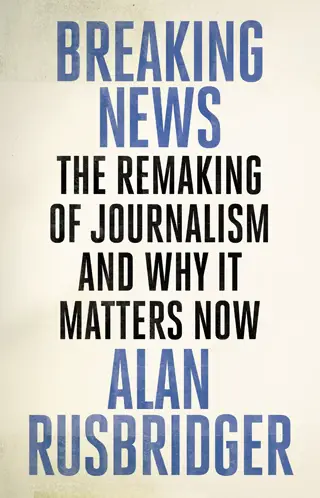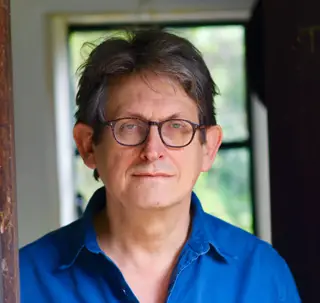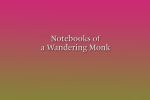Breaking News by Alan Rusbridger – Review

By Barney Bardsley
Alan Rusbridger was editor of The Guardian newspaper from 1995 to 2015. During that twenty year period, the entire world of journalism was turned upside down, with the advent of the digital revolution, and the subsequent threat to survival facing print newspapers worldwide. During that time, too, wave after wave of scandal broke. On his watch, The Guardian, and its sister paper The Observer, dealt with: Julian Assange, and the Wikileaks mass release of top secret government and military material; Edward Snowden, and his astonishing revelations about industrial-scale surveillance by the US and UK governments; the horror of phone hacking in the UK – and the subsequent loss of public trust in the profession of journalism itself.
Rusbridger regularly faced litigation, and government threats from the highest level, whilst he executed what he saw as his duty to inform and educate the public on some of the darkest doings in both commerce and government. It is a wonder that the guy ever got a decent night’s sleep, during any of those tumultuous two decades!
His book is a dense and informative account – an insider’s view – into the history and workings of a great liberal newspaper, as it grapples with the complexities of the global online market, together with the increasing vilification of journalism, in our contemporary world of “fake news” and the frequent suppression of truth. With the rise of Facebook, Twitter and the like, everyone seems to have a view, and fewer and fewer people seem to value the hard and thorough work of the principled professional writer. Too often, contemporary news is a horrible game of who-shouts-loudest-wins. It’s a jungle out there, to be sure. But Alan Rusbridger is a champion of the work of real journalists, and his conviction shines through here.
“Sobering to read”
In my house, growing up, the then Manchester Guardian was regarded with respect and affection by parents who came from Manchester themselves, and whose liberal-left views chimed with the studious and thoughtful approach of their home-town broadsheet. It was a proud moment for my father when I had my first Guardian feature published in 2005 – after twenty years of journalism elsewhere – and it was a proud moment for me too. The Guardian is a newspaper I have loved, read and written for, throughout my adult life. As a freelance writer, I am only too painfully aware of how hard it is to get published and paid anywhere these days.
But even so, it was sobering to read, in Rusbridger’s unflinching account, of just how extraordinarily tough it has been, for his newspaper to survive at all, in the current economic climate. These days, The Guardian – mainly through its online presence – has a huge global reach, and it has put a massive amount of resources and research into its digital operation. At the same time, it has nurtured a membership scheme, to help keep a sense of ownership amongst its readers – and to give the organisation a personal face, amidst the anonymity of the world wide web.
 It is, of course, no longer the Manchester Guardian – and hasn’t been for many years. It belongs somewhere else now, although I am not sure, these days, exactly where that might be. Like many journalists, I mourn the demise of print, but we are in a different world now, and one in which newspapers are right on the frontline, in learning how to negotiate.
It is, of course, no longer the Manchester Guardian – and hasn’t been for many years. It belongs somewhere else now, although I am not sure, these days, exactly where that might be. Like many journalists, I mourn the demise of print, but we are in a different world now, and one in which newspapers are right on the frontline, in learning how to negotiate.
“Breathtaking speed of change”
The double meaning of the title, Breaking News is clever and very clear. What is the future of journalism, of news itself, when all the old methods have fallen apart – and the new ones are not always to be trusted? In the current breathtaking speed of change, is the news itself in danger of being “broken”? Rusbridger has no real answer to this, but his belief in “honest, enquiring, brave journalism” remains undaunted. It is the foundation on which his newspaper was built.
The Guardian owes its origins to a businessman and reformer, John Edward Taylor, who was present at the Peterloo Massacre in 1819, which has now been immortalised in Mike Leigh’s new film, Peterloo. This tragedy took place in St Peter’s Square, Manchester, when a 60,000 strong unarmed crowd gathered to hear radical reformer Henry Hunt speak on equal rights for the working classes – and were set upon by the city’s yeomanry, causing eleven deaths and multiple injuries. It was Taylor’s determination to get the word out to the wider world, that led to the founding of the Manchester Guardian, eighteen months after the massacre. Journalism had a major part to play in the dissemination of uncomfortable facts – holding truth to power – in 1819. Two hundred years later, its role remains equally vital, if not more so, in an increasingly violent and unstable world. As Rusbridger says, “if the world wakes up in time then we may be all right. Trust me, we do not want a world without news.”
‘Breaking News: The Remaking of Journalism and Why It Matters Now’ by Alan Rusbridger is published
by Canongate










